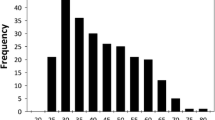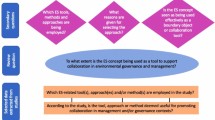Abstract
Ecosystem management (EM) is a process for addressing environmental problems that involves research utilizing interdisciplinary approaches. The work presented here examines the perspectives on the interdisciplinary research process from researchers involved in generating knowledge to contribute to EM. The goal is to generate critically reflective discussions about interdisciplinary practice. We conducted a set of targeted key-informant, semi-structured interviews (n = 15). Interviews followed a general questioning guide that included: experience doing interdisciplinary research; descriptions of the interdisciplinary process; understandings on how to conduct interdisciplinary research; interest in theories of interdisciplinarity; and interest in how the interdisciplinary process takes place. We coded interview transcripts to gain an in-depth understanding of how respondents perceive interdisciplinary research practice. Results indicate that discussions about how interdisciplinary research is conducted are not currently an important part of research activity among researchers contributing to EM. Rather, participants in the study see interdisciplinary practice as under theorized, spontaneous, and mainly intuition-based. They understand interdisciplinary research as a collaborative effort to integrate insights from different disciplines, but details about how to achieve integration remain hidden inside a “black box.” Results suggest that researchers in EM would benefit from specific guidelines for integrating insights across disciplines. The work discusses how opening the “black box” and considering explicit and detailed descriptions about the integration process might benefit interdisciplinary practice in research for conservation. This study contributes to future in-depth debates on how to generate dialectical engagement between EM researchers and those studying theories of interdisciplinarity in fields such as interdisciplinary studies.
Similar content being viewed by others
References
Baxter J, Eyles J. 1997. Evaluating qualitative research in social geography: establishing “rigour” in interview analysis. Trans Inst Br Geogr 22:505–25.
Bazeley P. 2007. Qualitative data analysis with NVivo. London: SAGE Publications.
Belevitch V. 1962. Summary of history of circuit theory. Proc Inst Radio Eng 50:848–55.
Berkes F, Colding J, Folke C, Eds. 2003. Navigating social–ecological systems building resilience for complexity and change. Cambridge: Cambridge University Press.
Biggs HC, Coetzee Y, Dent MC. 2000. Development of a metadatabase to support a multi-organisational, multi-disciplinary river ecosystem research and management initiative—experiences from the Kruger National Park Rivers Research Programme. Water SA Pretoria 26:77–82.
Christensen NL, Bartuska AM, Brown JH, Carpenter S, Dantonio C, Francis R, Franklin JF, Macmahon JA, Noss RF, Parsons DJ, Peterson CH, Turner MG, Woodmansee RG. 1996. The report of the Ecological Society of America Committee on the scientific basis for ecosystem management. Ecol Appl 6:665–91.
Chubin DE, Porter AL, Rossini FA, Eds. 1986. Interdisciplinary analysis and research: theory and practice of problem-focused research and development. Mt. Airy: Lomond Publications.
Clark TW. 2002. The policy process a practical guide for natural resource professionals. New Haven: Yale University Press.
Cordell HK, Bergstrom JC, Eds. 1999. Integrating social sciences with ecosystem management human dimensions in assessment, policy, and management. Champaign: Sagamore Publishing.
Creswell JW. 2007. Qualitative inquiry and research design: choosing among five approaches. Thousand Oaks: Sage Publications.
Creswell JW, Plano Clark VL. 2011. Designing and conducting mixed methods research. Los Angeles: SAGE Publications.
Denzin NK, Lincoln YS, Eds. 2000. The handbook of qualitative research. Thousand Oaks: Sage Publications.
Dey I. 1993. Qualitative data analysis a user-friendly guide for social scientists. New York: Routledge.
di Castri F, Hadley M. 1985. Enhancing the credibility of ecology: is interdisciplinary research for land use planning useful? Geo J 13:299–325.
Eigenbrode SD, O’Rourke M, Wulfhorst JD, Althoff DM, Goldberg CS, Merrill K, Morse W, Nielsen-Pincus M, Stephens J, Winowiecki L, Bosque-Perez NA. 2007. Employing philosophical dialogue in collaborative science. Bioscience 57:55–64.
Ewert AW, Baker DC, Bissix GC, Eds. 2004. Integrated resource and environmental management the human dimension. Cambridge: CABI Publishing.
Gray B. 1989. Collaborating: finding common ground for multiparty problems. San Francisco: Jossey-Bass Publishers.
Grumbine RE. 1994. What is ecosystem management. Conserv Biol 8:27–38.
Grumbine RE. 2002. Reflections on “what is ecosystem management”. Conserv Biol 11:41–7.
Heberlein TA. 1988. Improving interdisciplinary research—integrating the social and natural-sciences. Soc Nat Resour 1:5–16.
Heemskerk M, Wilson K, Pavao-Zuckerman M. 2003. Conceptual models as tools for communication across disciplines. Conserv Ecol 7. [online] URL: http://www.consecol.org/vol7/iss3/art8/.
Hirsch Hadorn G, Ed. 2008. Handbook of transdisciplinary research. Dordrecht: Springer.
Jakobsen CH, Hels T, McLaughlin WJ. 2004. Barriers and facilitators to integration among scientists in transdisciplinary landscape analyses: a cross-country comparison. For Policy Econ 6:15–31.
Keen M, Brown VA, Dyball R, Eds. 2005. Social learning in environmental management towards a sustainable future. London: Earthscan.
Keough HL, Blahna DJ. 2006. Achieving integrative, collaborative ecosystem management. Conserv Biol 20:1373–82.
Klein JT. 2000. A conceptual vocabulary of interdisciplinary science. In: Weingart P, Stehr N, Eds. Practising interdisciplinarity. Toronto: University of Toronto Press. p 3–24.
Kvale S. 1996. Interviews: an introduction to qualitative research interviewing. Thousand Oaks: Sage Publications.
Lee KN. 1993. Compass and gyroscope integrating science and politics for the environment. Washington, DC: Island Press.
Lele S, Norgaard RB. 2005. Practicing interdisciplinarity. Bioscience 55:967–75.
Lowe P, Whitman G, Phillipson J. 2009. Ecology and the social sciences. J Appl Ecol 46:297–305.
MacMynowski DP. 2007. Pausing at the brink of interdisciplinarity: power and knowledge at the meeting of social and biophysical science. Ecol Soc 12. [online] URL: http://www.ecologyandsociety.org/vol12/iss11/art20/.
Max-Neef MA. 2005. Foundations of transdisciplinarity. Ecol Econ 53:5–16.
Maxwell JA. 2005. Qualitative research design an interactive approach. Thousand Oaks: Sage Publications.
Miles MB, Huberman AM. 1994. Qualitative data analysis: an expanded sourcebook. Thousand Oaks: Sage Publications.
Newell WH. 2007. Decision-making in interdisciplinary studies. In: Morcol G, Ed. Handbook of decision-making. New York: Marcel Dekker. p 245–65.
Noss RF, Cooperrider A. 1994. Saving nature’s legacy protecting and restoring biodiversity. Washington, DC: Island Press.
Patton MQ. 2002. Qualitative research and evaluation methods. Thousand Oaks: Sage Publications.
Pickett STA, Burch WR, Grove JM. 1999. Interdisciplinary research: maintaining the constructive impulse in a culture of criticism. Ecosystems 2:302–7.
Pohl C, van Kerkhoff L, Hirsch Hadorn G, Bammer G. 2008. Integration. In: Hirsch Hadorn G, Ed. Handbook of transdisciplinary research. Dordrecht: Springer. p 411–24.
Pujadas Botey A. 2010. Interdisciplinarity in ecosystem management. Edmonton: Department of Earth and Atmospheric Sciences. University of Alberta. p 168.
Pujadas Botey A, Garvin T. 2010. Interdisciplinary research in ecosystem management: a literature evaluation. Int J Sci Soc 1:185–213.
Pujadas Botey A, Garvin T, Szostak R. 2012. Ecosystem management research: clarifying the concept of interdisciplinary work. Interdiscip Sci Rev 37:161–78.
Repko AF. 2011. Interdisciplinary: research process and theory. Los Angeles: SAGE Publications.
Repko AF, Newell WH, Szostak R. 2012. Case studies in interdisciplinary research. Thousand Oaks: Sage Publications.
Rubin HJ, Rubin IS. 2005. Qualitative interviewing: the art of hearing data. Thousand Oaks: Sage Publications.
Sievanen L, Campbell LM, Leslie HM. 2012. Challenges to interdisciplinary research in ecosystem-based management. Conserv Biol 26:315–23.
Stokols D, Misra S, Moser RP, Hall KL, Taylor BK. 2008. The ecology of team science—understanding contextual influences on transdisciplinary collaboration. Am J Prev Med 35:S96–115.
Szostak R. 2002a. How to do interdisciplinarity: integrating the debate. Issues Integr Stud 20:103–22.
Szostak R. 2002b. Intuition and interdisciplinarity: a reply to Mackey. Issues Integr Stud 20:131–7.
Szostak R. 2004. Classifying science: phenomena, data, theory, method, practice. Dordrecht: Springer.
Thornhill A. 2003. Social scientists and conservation biologists join forces. Conserv Biol 17:1476.
Tress B, Tress G, Fry G. 2005. Integrative studies on rural landscapes: policy expectations and research practice. Landsc Urban Plan 70:177–91.
Van Kerkhoff L. 2005. Integrated research: concepts of connection in environmental science and policy. Environ Sci Policy 8:452–63.
Weiss RS. 1994. Learning from strangers the art and method of qualitative interview studies. New York: Free Press.
Wilson EO. 1998. Integrated science and the coming century of the environment. Science 279:2048.
Wondolleck JM, Yaffee SL. 2000. Making collaboration work lessons from innovation in natural resource management. Washington, DC: Island Press.
Yaffee SL. 1999. Three faces of ecosystem management. Conserv Biol 13:713–25.
Acknowledgments
This project was supported by a scholarship from the Consejo Nacional de Ciencia y Tecnología, México (scholarship 205603/228694) and research funds by the Killam Foundation. First author is grateful for the support of the Community, Health and Environment Research Centre at the University of Alberta. Authors thank the people who agreed to participate in this study. Thanks are also extended to the editors and anonymous reviewers for their constructive feedback.
Author information
Authors and Affiliations
Corresponding author
Additional information
Author Contributions
APB: conceived and designed the study, performed the research, analyzed data, and wrote the paper; TG: designed the study and wrote the paper; RS: wrote the paper.
Rights and permissions
About this article
Cite this article
Pujadas Botey, A., Garvin, T. & Szostak, R. Interdisciplinary Research for Ecosystem Management. Ecosystems 17, 512–521 (2014). https://doi.org/10.1007/s10021-013-9737-1
Received:
Accepted:
Published:
Issue Date:
DOI: https://doi.org/10.1007/s10021-013-9737-1




